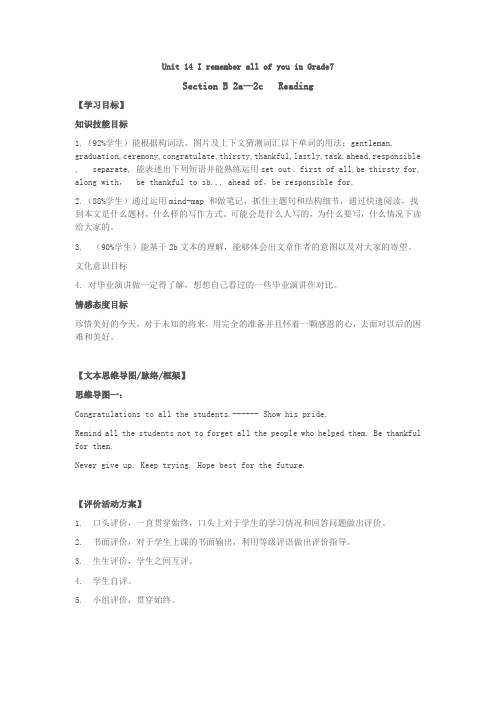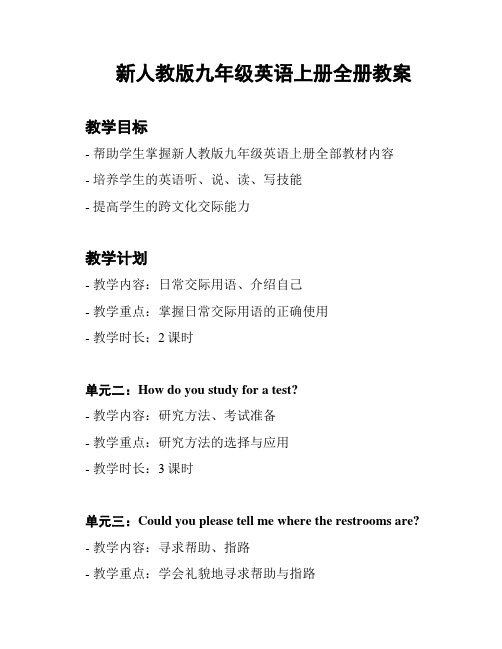【初中英语】英语九年级教案(全套教案) 人教版93
英语人教版九年级全册完整教学设计

Unit 14 I remember all of you in Grade7Section B 2a—2c Reading【学习目标】知识技能目标1.(92%学生)能根据构词法、图片及上下文猜测词汇以下单词的用法:gentleman, graduation,ceremony,congratulate,thirsty,thankful,lastly,task,ahead,responsible , separate, 能表述出下列短语并能熟练运用set out。
first of all,be thirsty for, along with,be thankful to sb.,, ahead of,be responsible for,2.(88%学生)通过运用mind-map 和做笔记,抓住主题句和结构细节,通过快速阅读,找到本文是什么题材,什么样的写作方式。
可能会是什么人写的,为什么要写,什么情况下读给大家的。
3. (90%学生)能基于2b文本的理解,能够体会出文章作者的意图以及对大家的寄望。
文化意识目标4. 对毕业演讲做一定得了解,想想自己看过的一些毕业演讲作对比。
情感态度目标珍惜美好的今天,对于未知的将来,用完全的准备并且怀着一颗感恩的心,去面对以后的困难和美好。
【文本思维导图/脉络/框架】思维导图一:Congratulations to all the students.------ Show his pride.Remind all the students not to forget all the people who helped them. Be thankful for them.Never give up. Keep trying. Hope best for the future.【评价活动方案】1. 口头评价,一直贯穿始终,口头上对于学生的学习情况和回答问题做出评价。
(完整版)人教版新目标初中九年级英语全册教案

(完整版)人教版新目标初中九年级英语全册教案-CAL-FENGHAI-(2020YEAR-YICAI)_JINGBIANUnit 3 Teenagers should be allowed to choose their own clothes.Section AThe Third PeriodTarget language:A: What rules do you have at home?B: Well, I'm not allowed to go out on school nights. How about you?A: I'm not allowed to go out on school nights either. But I can study at a friend's house.教学难点Talk about agreement and disagreement.教学内容及教师活动学生活动设计意图Step 1 RevisionCompetition: Write “are allowed to” and “aren't allowed to” on the blackboard. Divide the class into groups.Each group is asked to write down as many things as they can think of about what teenagers are or aren't allowed to do. See which group can think of the most items for each category.Step 2 PresentationI.1aThis activity reviews the use of always, sometimes, usually and never.Point to the picture. Ask students to describe what is happening in the picture.Help students to say, The boy is late for class. Invite a student to read the four questions in the box to the class.Read the instructions and remind students of the exact meanings of the adverbs of frequency. Work as theteacher says.Look at thepictures and saywhat is happeningin each picture.Students finishthe task on their激发学生兴趣,对所学知识进行复习,使记忆更加深刻。
人教版九年级英语全册教案

人教版九年级英语全册教案教案标题:人教版九年级英语全册教案教案目标:1. 通过本教案的学习,学生将能够掌握九年级英语全册所涵盖的语法、词汇和听说读写技能。
2. 培养学生的英语学习兴趣,提高他们的自主学习能力和合作学习能力。
3. 培养学生的跨文化交际意识,增强他们的跨文化交流能力。
教学重点:1. 掌握九年级英语全册的语法知识和词汇量。
2. 提高学生的听说读写能力。
3. 培养学生的跨文化交际意识。
教学难点:1. 帮助学生理解和运用九年级英语全册的语法知识。
2. 提高学生的听力和口语表达能力。
3. 培养学生的跨文化交际能力。
教学准备:1. 九年级英语全册教材和教学辅助资料。
2. 多媒体设备和相关课件。
3. 学生课本和练习册。
教学过程:Unit 1: Hello!Lesson 1: Greetings and IntroductionsStep 1: Warm-up- 通过展示与问答的形式,复习和引入与问候和介绍相关的词汇和表达方式。
Step 2: Presentation- 使用多媒体设备和图片,展示不同国家的问候方式和介绍习惯,引发学生的兴趣和好奇心。
Step 3: Practice- 学生分组进行角色扮演,模拟不同场景下的问候和介绍情景,并通过互动练习加深对语言的理解和运用能力。
Step 4: Consolidation- 向学生介绍并解释本课时的重点词汇和语法知识,帮助他们理解和掌握。
Step 5: Extension- 提供一些额外的练习和活动,以巩固学生对本课时所学内容的掌握,并扩展他们的思维和表达能力。
Step 6: Homework- 布置相关的课后作业,包括练习册上的题目和口头作业,以巩固学生对本课时所学内容的掌握。
教学评价:1. 教师通过观察学生在课堂上的表现和参与度,评价他们对本课时所学内容的理解和掌握程度。
2. 学生完成的课后作业和口头作业,以及课堂上的小组活动和角色扮演,也可作为评价学生学习情况的依据。
人教版九年级英语教案

人教版九年级英语教案一、教学目标。
1. 语言知识目标。
- 学生能够掌握本单元的重点单词,如“influence”“require”“silent”等,并能准确发音、拼写和运用。
- 理解并熟练运用重点短语和句型,如“be influenced by”“require sb. to do sth.”等。
2. 语言技能目标。
- 听力方面,能听懂有关人物性格变化及其原因的对话和短文。
- 口语方面,能够用英语流利地描述人物的性格特点以及这些特点形成的原因。
- 阅读方面,能读懂关于个人成长和性格发展的文章,掌握文章的主要内容和细节信息,并能根据文章进行简单的推理。
- 写作方面,能够根据所给话题,写出一篇关于人物性格变化的短文,内容完整,语言表达准确。
3. 情感态度目标。
- 让学生意识到成长过程中各种因素对性格的影响,鼓励学生积极面对生活中的变化,培养积极向上的人生态度。
4. 文化意识目标。
- 了解不同文化背景下人们性格形成的差异,拓宽国际视野。
二、教学重难点。
1. 教学重点。
- 重点单词、短语和句型的学习与运用。
- 掌握描述人物性格变化的表达方式。
2. 教学难点。
- 如何引导学生理解并运用较复杂的句子结构,如含有定语从句的句子来描述人物性格变化的原因。
- 让学生在口语和写作中准确地表达自己的观点,并使内容富有逻辑性。
三、教学方法。
1. 情景教学法。
通过创设各种与生活实际相关的情景,让学生在真实的语境中学习和运用英语。
例如,创设一个同学聚会的情景,让学生描述多年不见的同学性格上的变化。
2. 任务驱动法。
布置各种任务,如小组讨论、角色扮演、短文写作等,让学生在完成任务的过程中提高语言综合运用能力。
3. 交际教学法。
鼓励学生之间、学生与教师之间进行英语交流,培养学生的口语表达能力和交际能力。
四、教学过程。
(一)导入(5分钟)1. 老师走进教室,脸上带着神秘的笑容,然后说:“Hey, guys! Today we are going to embark on an interesting journey about how people change. You know, just like a caterpillar turns into a beautiful butterfly. Let's first lookat some pictures.”(展示一些名人小时候和长大后的对比照片,如周杰伦、哈利·波特扮演者丹尼尔·雷德克里夫等)2. 接着问学生:“Can you see any differences in their looks? And what about their personalities? Do you think they have changed?”引导学生简单讨论并分享自己的看法。
人教版九年级上册英语教案(优秀5篇)

人教版九年级上册英语教案(优秀5篇)(经典版)编制人:__________________审核人:__________________审批人:__________________编制单位:__________________编制时间:____年____月____日序言下载提示:该文档是本店铺精心编制而成的,希望大家下载后,能够帮助大家解决实际问题。
文档下载后可定制修改,请根据实际需要进行调整和使用,谢谢!并且,本店铺为大家提供各种类型的经典范文,如合同协议、条据文书、策划方案、总结报告、党团资料、读书笔记、读后感、作文大全、教案资料、其他范文等等,想了解不同范文格式和写法,敬请关注!Download tips: This document is carefully compiled by this editor. I hope that after you download it, it can help you solve practical problems. The document can be customized and modified after downloading, please adjust and use it according to actual needs, thank you!Moreover, our store provides various types of classic sample essays, such as contract agreements, documentary evidence, planning plans, summary reports, party and youth organization materials, reading notes, post reading reflections, essay encyclopedias, lesson plan materials, other sample essays, etc. If you want to learn about different formats and writing methods of sample essays, please stay tuned!人教版九年级上册英语教案(优秀5篇)九年级是整个初中阶段的重要一年,因此教师需要学习先进的教育理念,认真准备每一次教案。
新人教版九年级英语上册全册教案

新人教版九年级英语上册全册教案教学目标- 帮助学生掌握新人教版九年级英语上册全部教材内容- 培养学生的英语听、说、读、写技能- 提高学生的跨文化交际能力教学计划- 教学内容:日常交际用语、介绍自己- 教学重点:掌握日常交际用语的正确使用- 教学时长:2课时单元二:How do you study for a test?- 教学内容:研究方法、考试准备- 教学重点:研究方法的选择与应用- 教学时长:3课时单元三:Could you please tell me where the restrooms are? - 教学内容:寻求帮助、指路- 教学重点:学会礼貌地寻求帮助与指路- 教学时长:2课时单元四:I used to be afraid of the dark.- 教学内容:过去的经历和惯- 教学重点:掌握过去式的使用- 教学时长:2课时单元五:What are the benefits of going green?- 教学内容:环境保护、可持续发展- 教学重点:理解环境保护的重要性- 教学时长:3课时单元六:I love music that I can dance to.- 教学内容:音乐、电影与艺术- 教学重点:学会表达自己对音乐、电影和艺术的喜好和感受- 教学时长:2课时单元七:Teenagers should be allowed to choose their own clothes.- 教学内容:青少年的权利与责任- 教学重点:理解和讨论青少年应有的权利与责任- 教学时长:3课时单元八:Reading for pleasure- 教学内容:阅读和写作- 教学重点:培养学生的阅读兴趣和写作能力- 教学时长:4课时单元九:Wildlife protection- 教学内容:野生动物保护- 教学重点:了解野生动物保护的重要性,并表达自己的看法- 教学时长:2课时单元十:Musical instruments- 教学内容:乐器与音乐- 教学重点:了解各种乐器和音乐类型,并能进行简单的介绍- 教学时长:3课时教学评价- 结合课堂表现、作业成绩、测试等多种评价方式进行评价- 通过个人表现、小组合作等方式培养学生的主动研究能力- 鼓励学生参与课堂互动,提高口语表达能力参考资料- 教材:新人教版九年级英语上册- 辅助教材:听力材料、课外阅读材料等。
人教版九年级英语上册教案(全册)
九年级英语上册全册教案Lesson1Teaching & Practicing lessonPeriod 1 for the whole lessonⅠ Teaching Material1.Functional and notional items: Talk about what has done.nguage points: words: CD player, several, shelf,Sentences: Have you got …? I haven’t got …. Have you seen it anywhere Ⅰ Teaching Objectives1.Talk about what has done orally.2.Try to understand the whole lesson and read it fluently. The tone and pronunciation should be basicallyright.3.Master the following words and sentences.4Ss: Words: CD player, shelf, severalYes, I have. / No, Sentences: Have you got …? I haven’t got …. Have you seen it anywhere?I haven’t.Ⅰ Teaching Points1.The main points: Ⅰ&Ⅰ of teaching objectives2.The difficult point:Ⅰ shelf (pl) shelvesⅠI have a pen.= I have got a pen.Ⅰthe use of the present perfect tenseⅠ Teaching Procedureanization of the classA.GreetingB.Raise requirementT: We’re going to talk about the library.2.ReviewA.OralT: Do we have a library in our school? What do we have in the library? What can we do in the library?3.The teaching of the new lessonLesson 1T: Let’s learn Unit 1 In the library, Lesson 1. (write down the title)Teach: Have you got …?T: If you want to borrow a history book from the library, what do you say?Ss: Excuse me, do you have a history book?T: Yes, and we can also say: Have you got a history book?Write down the new sentence and compare the new one and the old one. Then teach the negative form and simple question form.And make more examples.Examples: He has got a good pen.They haven’t got any water.Our school has got a lot of students.B、Teach: Part 1T: Have you got a ruler? S1: Yes, I have. Here you are.T: Have you got an umbrella? S2: Sorry, I haven’t. Ask …Ask the Ss to use Part 1 to make new dialogue in pairs and then ask some to do it in front of the class. Teach player” at the same time.B.Teach: severalT: Have you got a pen? How many pens have you got?S1: FiveT: We may also say: “You’ve got several pens.”Write down the word: severalB.Teach: shelfT: Just now we talked about the library, we know there are many books in the library. Where are the books put? Teach: on the shelf shelf (pl) shelvesB.Part2T: Now I’d like you to make a dialogue talking about borrowing books about different subjects.Do it in pairs first then ask some to do it.Analysis: books about … at the moment = now = right nowB.Part 3Dialogue 1Listen and answer: Well, when you borrow books from the library, you must be careful, but Jim is not careful. What happened? Where was the book?Then read it and learn the dialogue.Analysis: Have you seen it anywhere? ( tense and the use of anywhere)Dialogue 2Listen and answer: How about Tom? What has he lost? Where was it?Read and learn.Analysis: have lost (tense)Perhaps he’s seen it. ( ‘s is short for has)I saw it on Lin Tao’s desk five minutes ago. ( tense)B. Conclusion1. have got = have 2 several = a few 3.on the shelf 4. the present perfect tenseA.Wb. Ex1 &24.Homework1.Do Wb. Ex 3&42.Recite Part 3Lesson 2Reading lesson2 periods for Lesson 2ⅠTeaching Materialsnguage points:Words: already, yard, schoolyard, step, librarian, probably, pay, sadly, mark, bookmarkPhrases: used to, put down, pay for, come up withSentences: Her hobby is reading.So was the librarian.Now her lost books are usually returned to the library.ⅠTeaching Objectives1.Read the whole lesson and try to understand its content. Make sure to answer the questions in Wbcorrectly.2.Read the lesson fluently, the pronunciation and tone should be right.Ⅰ Teaching Points1.The main points---(1)&(2) in teaching objectives2.The difficult pointsA: already, “al” makes an / / soundB: the difference between “on” and “about”C: make sb. + adj.D: used to do sth.E: come up with an idea= think of an ideaPeriod 1Ⅰ Teaching Procedureanization of the classT: Today we are going to Lesson 2, in Lesson 2, we are going to talk about the library.2.ReviewT: Before we learn the new lesson, let’s go over what we learned yesterday.A.OrallyHave = have got eg. They don’t have any shelves.= They haven’t got any shelves.Has = has got eg. Does he have a CD player?= Has he got a CD player?Several=a fewOn the shelfThe construction and concept of the present perfect tenseB.Recite Part 2C.Wb. Ex33.The teaching of the new lessonA.Lesson 2T: We know we can borrow books from a library. But if we lose the books, what should we do? Letgo on to learn Lesson 2, we will know the answer in it.( write down Lesson 2)B.pay forWell, you should pay for it.Teach: pay, paid, paidPay for : give money to sb. for sth.C.onT: Why do people like to go to the library?T: Because there are books on many different subjects.D.knowledgePeople can learn much knowledge from them.E.Part 1 Pre-readF.Part 2Ask the Ss the read the passage and answer questions in their Wb. Ex 1G.Read and learnParagraph 1T: How old is the writer’s grandma?What was she?What is her hobby?Why does she love books?4.Homework.A. Read the end of the text and finish the exercises in Wb.Junior English for ChinaBook 3Lesson 3课型:讲练课ⅠTeaching Materials1.Functional and notional itemsAsk questions about something has donenguage MaterialsWords: encourage, once, abroad, copyPhrases: think of, encourage sb. to do sth., get sth. back, pick upSentences: Have you ever been abroad? Yes, just once.I’ve just cleaned the kitchen.Really? I did that hours ago.Grammar: The difference between the present perfect tense and the past indefinite tenseⅠTeaching Objectives1.Learn to ask questions about something has done2.Read the whole lesson fluently, and pronunciation and intonation should be right.3.Master the following materials(4 skills) Words: once, copyPhrases: think of, pick upSentences: Have you been abroad? Yes, only once.(3 skills) Words: encourage, abroadPhrases: get sth. back, be abroadⅠ Teaching Points1.The main points: (1)&(2) in teaching objectives2.The difficult points:A.“ever, just, already”, they should be put in the middle of “ have done”B. The difference between the present perfect tense and the past indefinite tenseⅠ Teaching Procedureanization of the class2.RevisionBefore we go on to learn the new lesson, let’s go over what we learn in Lesson 2.A.OralGrandma lost library books. If she really lose them, what should she do?Did the librarian have any ideas? What is it?What did they doB. Workbook Ex23.The teaching of the new lessonA.Lesson 3Can Grandma get all her lost books back? Let’s go on to learn Lesson 3.B.Read Part 1 and answer the following questions:Did Grandma get all her lost books back?How did she get them back?C.Read and learn*Think of:认为、想起、想出Eg: What do you think of it?I often think of my friends in Beijing.*Encourage sb. to do sth.Eg. The teacher thought a lot about how to encourage his students to study hard.*Pick up: pick it\them up*return sth. to sb.*get sth. from sb.D.Reading practiceE.Retell the storyF.Ask and answerHave you ever picked up a library book? Yes, I have\ No, I haven’t.Ask the students to ask and answer in pairs by using Part 2 and ask some to do it in class.Teach: abroad, onceDo Wb. Ex1G.Part 3Play and English songT: Have you ever listened to foreign music?Ss: Yes, we have.T: And we have just listened to it.Make sentences by using “ I have just…”Read and learnTeach: copyPoint out the difference between the present perfect tense and the past indefinite tense.The present perfect tense shouldn’t be used together with the past time.H.Conclusionthe use of “ever, just, already” in the present perfect tensethe difference between the present perfect tense and the past indefinite tense4.HomeworkA.Wb. EX2&3B.Go over the language pointsLesson 4课型:练习课ⅠTeaching Materialsnguage MaterialsWords: spoil, as, screenPhrases: on the computer, find outSentences: I guess somebody else has borrowed it.Could you find out who has taken it?Grammar: The present perfect tenseⅠTeaching Objectives4.Read the whole lesson fluently, and pronunciation and intonation should be right.5.Learn to read the information on the library cards and the computer screen.6.Master the following materials(4 skills) Word: asphrase: on the computer, find out(3 skills) Words: spoil, screenⅠ Teaching Points3.The main points: (1)&(2) in teaching objectives4.The difficult points: learn to read the information on the library cards and the computer screenⅠ Teaching Procedureanization of the classToday, we are going to learn Lesson 4. In Lesson 4, we’re going to talk about the information on thelibrary cards and the computer screen.6.RevisionBefore we go on to learn the new lesson, let’s go over what we learn in Lesson 3.A.OralHow could Grandma get all her lost books back?the use of the adverbs in the present perfect tense.7.The teaching of the new lessonA.Lesson 4Yesterday, we learned that grandma usually borrowed books from the library. There is a new librarytoday. If you want to read books, how can you find them? Let’s go on to learn Lesson 4.B.Part1I’d like you to listen and do Wb. Ex.1C.Part 2Ask the students to write down something about the school librarian and report it to the class. Teach:as He works there as a shop assistant.D.Part 4Learn to read the information on the cards and the computer screen.E.Part 3Listen and answer: What does the boy want to borrow?What’s its name?Who has borrowed it?Read and learn.has borrowed, has taken, has got( the present perfect tense)find outRead and act.F.Part 5Read and learn.G.Checkpoint 1H.Wb. Ex.2&58.HomeworkA.Wb. Ex 3B.Go over the whole unit.Lesson 5课型:讲练课ⅠTeaching Materials4.Functional and notional itemsA. Learn to ask how long sb. has done sth.B. Learn to talk about if someone has been to a place.nguage MaterialsWords: surf, surfing, surfer, wave, Hawaii, beach, twice, Bondi, none, Newquay, water-ski, canoe Phrases: have a try, since last Wednesday, learn sth. from sb. how to do it, several timesSentences: What’s …like?How long have you been in Sydney?Have you ever been to …?Grammar: the present perfect tenseⅠTeaching Objectives7.Learn to ask questions about something has done8.Read the whole lesson fluently, and pronunciation and intonation should be right.9.Master the following materials(4 skills) Words: surf, surfing, surfer, wave, beach, twice, nonePhrases: have a trySentences: Have you been to…? Several times.(3 skills) Words: water-ski, canoe(1 skill) Words: Hawaii, Bondi, NewquayⅠ Teaching Points5.The main points: (1)&(2) in teaching objectives6.The difficult points:A.“ever, just, already”, they should be put in the middle of “ have done”B. The difference between the present perfect tense and the past indefinite tenseⅠ Teaching Procedureanization of the classToday, we’re going to talk about water sports.2. RevisionRevise the names of the sports they have learnt: roller-skating, skating, jump, race, skiing.10.The teaching of the new lessonA.Lesson 5And swimming is a kind of water sport because you have to swim in the water.Well, what other water sports do you know? Let’s go on to learn Unit 2 Water sports.e colour page1 to teach: surf, surfing, surfer, wave, water-skiing, canoe.C.Part 1Listen and answer: Who can surf, Ted or Bruce?How long has Bruce been in Sydney?Why did he come to Sydney?Who teach Bruce to surf?Read and learn:What’s …like? = How is …?Since last WednesdayLearn sth. from sb.Have you ever been to …?Have a tryHow to do itD.Read and act.E.Part 2Have you ever surfed?Have you ever been to Hawaii?Ask and answer in pairsLearn: Bondi, Cape Town, Newquay, noneNo one 人单数No one is herenone 人/物单数/复数None of them is here.F.Wb. Ex3. 2 . 1 .G.ConclusionSurf, surfing, surfer, waveHe’s a surfer. Have a tryHow long have you been in …?Have you ever been to …?11.Homeworkwb. Ex 2P.S.The writing on the blackboardUnit 2 Water sportsLesson 5surf ⅠWhat’s …like? = How is …? Have a trylearn sth. from sb.surfing ⅠHow long have you been in …?surfer Since last Wednesday no one 人/ 单wave ⅠHave you ever been to …? none人/物单/复Hawaii ⅠNone of us has. none of us (true)Cape Town No one has. no one of us (false)Lesson 6ⅠTeaching MaterialsWords: describe, especially, attract, so-called, possible, since, part-time, although, fit, prize, competition, event, Olympic, Waikiki, Honolulu, San FranciscoPhrases: all over, large numbers of, no matter, both…and…, give up, ever since, the Olympic Games Sentences: Now it is enjoyed by people all over the world.You can always find surfers out riding the waves.In the morning, he works as a part-time assistant in a surf shop.ⅠTeaching Objectives1.Try to understand the whole passage and read the whole lesson fluently and the pronunciation andintonation should be right.2.Master the following materials:4Ss Words: describe, especially, attract, so-called, possible, since, part-time, although, fit, prize,competition, event, OlympicPhrases: all over, large numbers of, no matter, both…and…, give up, ever since, the Olympic Game Sentences: Now it is enjoyed by people all over the world.You can always find surfers out riding the waves.In the morning, he works as a part-time assistant in a surf shop.3.Master the following materials:3Ss Words: Waikiki, Honolulu, San FranciscoⅠ Teaching Points1.The main points: (1) &(2) in teaching objectives2.The difficult points: A. the use of “although” B. the use of “no matter”C. the use of “ both…and…”Ⅰ Teaching ProcedurePeriod 1anization of the classTalk about surfing2.ReviewHave you ever been to Qingdao?Who has ever been to Bondi Beach? None of us.Has anybody water-skied before? Nobody has.3.The teaching of the new lessonA.Lesson 6In Lesson 5, we learned some water sports. Today, we are going to talk about one of them----surfing.B.Talk about surfingWhere is the best place for surfing? Why?Have you ever watched people surf?What do you think of it?Ask the students to say something about it.Teach: fit, prize, competitionSurfing will make you fit( healthy). Maybe you can take part in a surfing competition, then you maywin a prize.Part 1 Pre-read Ask and answer then teach: watch sb. do sth.; describe sth.C.Part 2Read and do wb. Ex.1D.Conclusion.fit, win a prize4.HomeworkA.Go over what we learn todayB.Read the passage and find out all the new words, try to guess their meaning.Period 2Teaching Procedureanization of the classLearn the passage2.ReviewWatch sb. do sth.; fit(healthy); win a prize3.The teaching of the new lessonA. Paragraph 1Find out the key sentence. Then learn the new language points.one of…; be enjoyed by sb.; all over the world= everywhere in the world;be famous for\ as; especially; attract sb. to somewhere; large numbers of people(it is used to modify countable nouns)= a number ofRead this paragraph after the tape and then read it together. Ask some to read it in classB. Paragraph 2Find out the key sentence. Then learn the new language points..Read this paragraph after the tape and then read it together. Ask some to read it in classC.Paragraph 3Find out the key sentence. Then learn the new language points.D.Paragraph 4Find out the key sentence. Then learn the new language points.E.Conclusion4. HomeworkA.Wb. Ex. 2&3B.Retell the storyLesson 7课型:讲练课ⅠTeaching Materials1.Functional and notional itemsLearn to talk about something has donenguage materialsWords: such, fail, practice, New Zealand, businessPhrases: such great fun, on business, so farSentences: Time flies!He’s gone to New Zealand on business.ⅠTeaching Objectives1.Learn to talk about something has done.2.Try to understand the content and read the dialogue fluently, the pronunciation and intonation should beright.3.Master the following materials:4 skills Words: such, fail, practice, businessPhrases: so far, on businessSentences: He’s gone to …4.Master the following materials:2 skills Words: New ZealandⅠTeaching Points1.The main points: (1) & (2) in teaching objectives2.The difficult pointsA.such great funsuch+adj. +n.(不可数/复数)such a + adj. + n.(可数名词单数)与so的区别B.have been surfingC.practice sth.\ doing sth.D.gone to & been togone to去了,强调不在说话地点been to 去过,强调对某地有所了解,可以在说话地点ⅠTeaching Procedureanization of the classWe are going to talk about Bruce and Ted again. In grammar, we are going to talk about the present perfect tense.2.RevisionA.Retell the story in Lesson 6.B.Wb. Ex2&33.The teaching of the new lessonA.Lesson 7In lesson 5, we know Bruce will show Ted how to surf. Can Ted surf now?B.Listen and answerCan Ted surf? What has Bruce been doing every day? Why?When is Ted leaving for home?How about Bruce?Where is Bruce’s uncle?C.Read and learnTeach: *on Bondi Beach*such great fun: very funnysuch+adj. +n.(不可数/复数) such beautiful flowerssuch a + adj. + n.(可数名词单数) such a beautiful flowerso+ adj. So beautiful a flower前,要用“so”如果在数量词“many, much, few, little”eg: so much water, so many people* fail (in) the examfail to do sth.=can’t do sth.eg: fail the exam=not pass the examfail to catch the bus= miss the bus* need more practicepractice: 练习,实践(为不可数名词)如:Practice makes perfect.Practice : 练习(为及物动词)如:practice doing sth.* Time flies.* gone to去了,强调不在说话地点been to 去过,强调对某地有所了解,可以在说话地点eg: Where is he? He’s gone to his home.* on businessD.Reading Practice.E.Part 2 Ask and answeryet 用于否定句,一般疑问句及条件状语从句already用于肯定句,如果用于一般疑问句则表示惊讶的语气F.Answer the questions in groups. Teach: so far: up to nowAsk some to do it in classG.ConclusionH.Wb. Ex 14.HomeworkA.Recite Part 1B.Go over the whole lessonLesson 8课型:练习课ⅠTeaching MaterialsWords: cross, channel, mainland, slow, journey, among, proud, pride, unless, shot, truthPhrases: come true, slow down, be proud of, speak highly of, not only…but also…Sentences: Among them were his parents.He is not only the pride of our school, but also the pride of all the people in Hainan.ⅠTeaching Objectives1.Read the passage in Part 3 and try to understand its meaning. Read it fluently and the pronunciation andintonation should be right.2.Finish all the exercises in this lesson.3.Master the following materials as four skills:Words: cross, channel, mainland, slow, journey, among, proud, pride,Phrases: come true, slow down, be proud of, speak highly of, not only…but also…Sentences: Among them were his parents.He is not only the pride of our school, but also the pride of all thepeople in Hainan.4. Master the following materials as three skills: words: unless, shot, truthⅠTeaching Points1.The main points: (1) & (2) in teaching objectives如果连接两个主语时,用就近一致原则。
最新 人教版九年级 英语上册全册教案
最新人教版九年级英语上册全册教案第一课时
教学目标
- 研究并掌握单词:hello, hi, goodbye, bye, nice to meet you
- 能够用英语进行简单的自我介绍和问候
- 熟悉并能正确使用句子:Hello, I'm [name]. Nice to meet you. 教学重点
- 研究常用的问候语和自我介绍方式
- 练口语表达能力
教学准备
- 教材《人教版九年级英语上册》
- 教学PPT
教学步骤
1. 导入新课,向学生简要介绍本节课的内容,并激发学生研究
的兴趣。
2. 分发教材,让学生跟读单词:hello, hi, goodbye, bye, nice to meet you。
3. 解释单词的意思,帮助学生掌握词汇。
4. 利用示范和展示图片等方式,让学生理解并掌握句子:Hello, I'm [name]. Nice to meet you.
5. 引导学生进行口语练,让他们用所学内容进行自我介绍和问候。
6. 收集学生的口语表达,进行点评和纠正。
7. 结束本节课,作简单复,并布置下节课的预内容。
教学延伸
- 练更多的问候语和自我介绍方式,丰富学生的口语表达能力。
- 制作小组或角色扮演活动,让学生在真实情境中运用所学内容。
教学评价
- 观察学生的参与程度和口语表达能力,及时给予鼓励和指导。
- 收集学生的口头回答、书面练习,进行评估和改进教学策略。
人教版九年级上册英语教案5篇
人教版九年级上册英语教案5篇人教版九年级上册英语教案(篇1)一、指导思想以我区初中英语教学教研工作为指导,立足学校整体教学工作,以提高教研质量为目标,增强学习意识、服务意识、教研意识、质量意识、合作意识,充分发挥专业职能作用,以新课改为契机,以更新教育教学理念为导向,以课堂教学改革为重点,并注重培养学生的创新精神和实践能力,从而不断深化课堂教学改革,全面提升我校英语教研水平。
二、工作要点:1.加强教学常规的精细化管理,全面提高教学质量。
1).强化教学常规的落实,提高课堂教学效率,组织教师认真学习学校教学常规,指导检查教师的教学工作,进一步加强学科教学五环节的研究与管理,特别抓好“备课”、“上课”、“课后辅导”、“培优辅导”等主要环节,本学期聚焦“上课、作业”环节,注重教学的有效性。
特别在作业上统一标准,统一格式,统一订正,同时根据学生不同情况作业有分层。
2)组织英语课外活动和比赛。
做好期中期末命题的双向分析,跟踪补缺补差学生的成绩,加强月考命题分析的讨论和实施。
及时了解学生学习情况,调整教学和命题。
在教研组内部建立教学评价和质量保证体系,达到自我诊断、自我调节、自主发展的目的。
在英语教学中,我们提倡精选练习,精心编练,因材施教。
进一步做好英语方面的差距和差异的弥补。
加强九年级毕业班工作研究,提高毕业班教学效率。
加强对中考走势的信息收集和测试研究,集中精力,争取在九年级中考中取得一个满意的成绩。
2.?以教科研引领,为教师的专业化成长打造新的平台。
1).大力开展校本教研,拓宽教师课程视野,逐渐成为学习型、反思型教师。
通过同伴互动。
充分发挥学校骨干教师、优秀教师的作用,通过“共享式的集体备课”、“探究式的课堂实践活动”和“专题式的学习讨论活动”等促进教师之间的互动,营造“集体备课、资源共享、个人加减、教后反思”的教研氛围。
结合优质课堂活动,并且推出一节具有代表性的研讨课。
(陈美红老师开课)2).根据各年级特点,进行一次主题教研活动。
人教版九年级下册英语全册教案
人教版九年级下册英语全册教案一、教学目标1.让学生掌握本册书的核心词汇、短语和句型,提高学生的英语综合运用能力。
2.培养学生的听说读写技能,提高学生的英语实际运用能力。
二、教学内容1.Unit1-3:重点学习动词时态、被动语态、宾语从句等语法知识。
2.Unit4-6:重点学习情态动词、条件句、祈使句等语法知识。
3.Unit7-9:重点学习名词性从句、定语从句、状语从句等语法知识。
4.Unit10-12:重点学习过去进行时、过去完成时、过去将来时等语法知识。
Unit11.教学目标:学习一般过去时的动词变化,掌握过去进行时和过去完成时的区别。
2.教学重点:一般过去时的动词变化,过去进行时和过去完成时的运用。
3.教学难点:过去进行时和过去完成时的区别。
4.教学步骤:Step1:导入通过图片或故事引入本课主题,激发学生的学习兴趣。
Step2:讲解语法讲解一般过去时的动词变化,过去进行时和过去完成时的用法。
Step3:课堂练习学生进行课堂练习,巩固所学知识。
Step4:小组讨论学生分组讨论,运用所学知识进行实际交流。
Unit21.教学目标:学习情态动词can、may、must等,掌握其用法和区别。
2.教学重点:情态动词can、may、must的用法。
3.教学难点:情态动词的区别和实际运用。
4.教学步骤:Step1:导入通过图片或情景引入本课主题,激发学生的学习兴趣。
Step2:讲解语法讲解情态动词can、may、must的用法和区别。
Step3:课堂练习学生进行课堂练习,巩固所学知识。
Step4:角色扮演学生进行角色扮演,运用所学知识进行实际交流。
Unit31.教学目标:学习宾语从句的构成和用法,提高学生的句子表达能力。
2.教学重点:宾语从句的构成和用法。
3.教学难点:宾语从句的实际运用。
4.教学步骤:Step1:导入通过图片或故事引入本课主题,激发学生的学习兴趣。
Step2:讲解语法讲解宾语从句的构成和用法。
- 1、下载文档前请自行甄别文档内容的完整性,平台不提供额外的编辑、内容补充、找答案等附加服务。
- 2、"仅部分预览"的文档,不可在线预览部分如存在完整性等问题,可反馈申请退款(可完整预览的文档不适用该条件!)。
- 3、如文档侵犯您的权益,请联系客服反馈,我们会尽快为您处理(人工客服工作时间:9:00-18:30)。
This activity provides a comprehensive review of vocabulary presented in the unit. Focus attention on the box Invite a student to read the vocabulary words at the top.
anxious strange worried careful favorite Say, You are to fill in the blanks with the words. In some cases, you may need to use another form of the word, for example adjusting for tense or subject/verb agreement. Ask students to fill in the blanks on their own. Check the answers. Five students each read a sentence, filling in the blanks. The rest of the students check their answers: 1.favorite 2.careful 3.anxious 4.worried 5.strange Ask students to make their own sentences with the words, preferably sentences that are meaningful. Move around the room. Collect a few students' answers with mistakes on the blackboard. Help correct the mistakes. 1.What's your favorite song? 2.Be careful while crossing a road. 3.We are anxious for his safety. 4.You don't have to be worried about me. 5.I had a strange dream last night. Step Ⅲ Part 2 This activity provides reading, writing, listening and speaking practice using the target language. Show the vocabulary words on the screen by a projector. finger n. 手指 stone n. 石头;石块 ant n. 蚂蚁 poor adj. 贫穷的;贫困的 dishonest adj. 不诚实的 bark v. (狗等)吠声;叫声 wake v. 唤醒;弄醒 pretend v. 假装;佯若 use up 用完;用光;耗尽 attempt v. 试图;企图
Unit 5 It must belong to Carla
The Sixth Period Ⅰ.Teaching Aims and Demands 1.Knowledge Objects (1) Key Vocabulary finger, stone, ant, poor, dishonest, bark, wake, pretend, use up, attempt (2) Fill in blanks and make sentences using vocabulary words. (3) Learn some proverbs. (4) Circle the word that doesn't belong. 2.Ability Objects (1) Train students' writing skill. (2) Train students' ability of reading comprehension. (3) Train students' ability of clarifying. 3.Moral Object:We'll benefit a lot by learning proverbs. Ⅱ.Teaching Key Points 1.Make sentences using vocabulary words. 2.Say the meanings of different proverbs in your own words. 3.Circle the word that doesn't belong. Ⅲ.Teaching Difficult Points 1.Make sentences using vocabulary words. 2.Say the meanings of different proverbs in your own words. Ⅳ.Teaching Method:Teaching by explanation Ⅴ.Teaching Aid:A projector Ⅵ.Teaching Procedures Step Ⅰ Revision Ask several students to read the newspaper article in Activity 3a to the class. Step Ⅱ Part 1
Say the words and have students repeat them until they can pronounce them fluently and accurately.
Read the instructions to the class. Explain to the students that a proverb is a shortห้องสมุดไป่ตู้well-known saying that states a general truth or gives advice.
